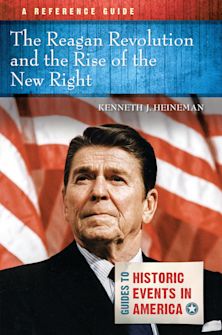- Home
- ACADEMIC
- History
- United States History
- Debating the Reagan Presidency
For information on how we process your data, read our Privacy Policy
Thank you. We will email you when this book is available to order
Buy from Bloomsbury eTextBooks
You are now leaving the Bloomsbury Publishing website. Your eBook purchase will be with our partner https://www.vitalsource.com.
Your credit card statement will show this purchase originating from VitalSource Technologies. They will also provide any technical assistance you might require.
You must sign in to add this item to your wishlist. Please sign in or create an account
Description
The presidency of Ronald Reagan has become a Rorschach Test for politicians and citizens alike. While many conservatives see the Reagan era of the 1980s as the high-water mark for their movement and a time of national recovery from the difficulties of the 1970s, many liberals maintain that the rosy Reagan legacy is based largely on myth, and that in fact his eight years as president caused serious harm to the country. John Ehrman and Michael W. Flamm give due attention to the lasting controversies surrounding the Reagan record and provide a balanced view of the fortieth president's foreign and domestic policies. Students are encouraged to draw their own conclusions by reading key primary documents.
Table of Contents
Part I: Debating the Reagan Presidency: Domestic Politics and Issues
Chapter 1: Excerpts from Inaugural Address (January 20, 1981)
Chapter 2: Excerpts from Economic Report of the President (1985)
Chapter 3: Excerpt from Walter Mondale's Speech Accepting the Democratic nomination (July 19, 1984)
Chapter 4: Remarks Announcing the Nomination of Robert H. Bork To Be an Associate Justice of the Supreme Court of the United States (July 1, 1987)
Chapter 5: Excerpts from Nomination of Robert H. Bork to be Associate Justice of the Supreme Court, Committee on the Judiciary, United States Senate Opening Statement of Robert H. Bork (September 15, 1987)
Chapter 6: Excerpts from Farewell Address to the Nation (January 11, 1989)
Part II: The Reagan Presidency and Foreign Policy: Controversies and Legacies
Chapter 7: Address to the British Parliament (June 8, 1982)
Chapter 8: Address to the National Association of Evangelicals (March 8, 1983)
Chapter 9: Address to the Nation … on United States-Soviet Relations (January 16, 1984)
Chapter 10: Minutes, National Security Planning Group Meeting (June 25, 1984)
Chapter 11: Addresses by New York Governor Mario Cuomo and Massachusetts Senator Edward Kennedy at the Democratic National Convention (July 16–19, 1984)
Chapter 12: Report of the Tower Commission (February 26, 1987)
Chapter 13: Address to the Nation on Iran-Contra (March 4, 1987)
Chapter 14: Remarks at Moscow State University (May 31, 1988)
Chapter 15: Address to the United Nations by Mikhail Gorbachev (December 7, 1988)
Bibliography
Product details
| Published | 01 Sep 2002 |
|---|---|
| Format | Ebook (Epub & Mobi) |
| Edition | 1st |
| Extent | 224 |
| ISBN | 9780742570573 |
| Imprint | Rowman & Littlefield Publishers |
| Series | Debating Twentieth-Century America |
| Publisher | Bloomsbury Publishing |
About the contributors
Reviews
-
John Ehrman and Michael Flamm have provided an excellent guide to the presidency of Ronald Reagan, one that will help readers understand this important and still controversial period in our recent history.
Alan Brinkley, Columbia University
-
Both essays are sympathetic to Reagan yet well balanced while also well written. To accompany their essays, the authors have compiled a bibliography and have included 15 brief primary documents, such as excerpts from Reagan's 1981 inaugural address and from his famous 1983 'evil empire' speech. The result, although conceived primarily for use in classrooms, is a good, concise summary of the major issues of the Reagan presidency.
Library Journal
-
This well-conceived and well-constructed volume will be a welcome addition to any syllabus covering Ronald Reagan or the 1980s. The two essays are comprehensive and balanced; the supporting primary source documents are well-chosen and excellent complements to the nuanced arguments. Highly recommended.
Gil Troy, McGill University, author of Morning in America: How Ronald Reagan Invented the 1980s



































